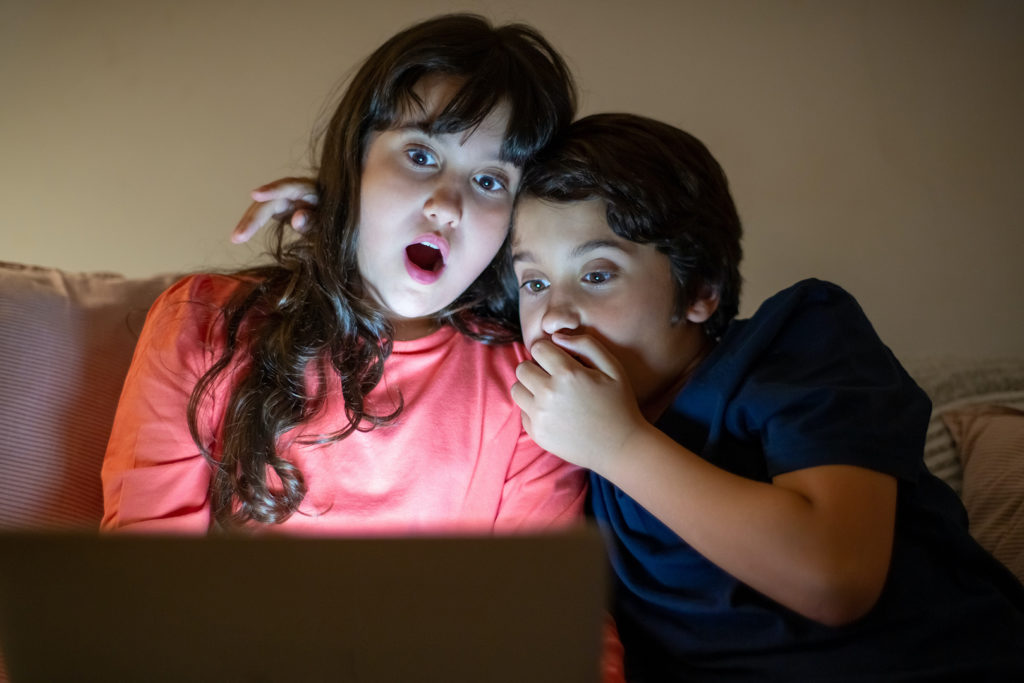
ARTS AND ENTERTAINMENT
This painting represents the turmoil experienced during a time of crisis. Typhoon is a symbol of anxiety, chaos, destruction and struggle. However, once those trial moments are surmounted, the inner energy of the typhoon brings transformation, putting life in order and strengthening one’s spirit. Emotional typhoon seems to tear life apart when it hits. One can’t turn away from it, but once it is over, it brings new potential; visions become clear and one sees brighter days ahead.
PAINTING BY FR RAUL TABARANZA MCCJ
CHALLENGES • DIGITAL PLATFORMS AND FAMILIES

Children and Social Media
Whether we are children or adults, our day-to-day choices about where we focus our attention are central to who we are and who we are becoming. With the youth spending more and more time using social media, it is increasingly important for us to be involved in assisting them to be discerning about the choices that will literally shape them and their lives
BY MARIOLA BRAVO | PRETORIA
IN THIS digital age, the world is no more than a global village. The dangers of what children might encounter online have increased so enormously that it includes every imaginable ill that society faces today. The world of social media is certainly a minefield that warrants careful navigation, yes, but is its use really without any merit whatsoever?
Beneficial online contents
Social media has many applications where its uses are invaluable. Some of these include helping youngsters stay connected with friends and family on a regular basis. This goes a long way towards sustaining essential contact with significant others. Maintaining these ties promotes emotional wellbeing and supports mental health. Within the school environment, supplements, study aids and communications can be shared by educators and between fellow students through this medium. Large parts of what the youth share online include ideas, music and art which bond them together as a generation. These also include sharing content about current trends, songs, games, TV series, news or hobbies that form the stories and memories of their childhood.
Many children have extraordinary talents and potential. Social media gives them the opportunity to meet and interact with others online where they can share and develop their interests together. Consider the worldwide reach of social media to bring talent together in collaboration and creativity. Among these online global communities and networks are those that cater to young people with disabilities or medical conditions or children from particular cultural backgrounds, ex-patriots and so on, giving them a sense of connection and belonging.
Negative influences
The flip side of this is that social media can be a hub for the propagation of negativity and destructiveness. Such activities include the sale of illicit substances and popularisation of questionable activities, cyberbullying and sharing of violent or sexual comments or images. Without meaning to, kids can share more online than they should. Kids also face the possibility of a physical encounter with the wrong person. Some apps automatically reveal the user’s location when they post. User profiles often include the names of children’s schools, club affiliations and regular activities. This can make children easy targets for online predators and others who might mean them harm.
Large parts of what the youth share online include ideas, music and art which bond them together as a generation
Limitless screen time has far-reaching effects on our children’s mental, emotional and physiological development. Studies show that social media is highly addictive. A normal occurrence when an individual receives praise, experiences success, or gets recognition of any kind is that a substance called dopamine is released by the brain. With each game won or positive comment received, youngsters get a rush of happiness characteristic of the natural dopamine, and automatically, they want more. The risk here is that children become dependent on positive feedback and their usage increases accordingly. Mental health issues and suicidal tendencies increase as opinions are fickle and oftentimes teenagers can be devastated when the dopamine fix falls without warning. It is as dangerous as any drug that is for sale. In this case, it is completely legal and is a potential threat that has infiltrated your home.

Sadly there are very serious dangers facing our children’s young and curious minds. In fact, normal curiosity can quickly and easily turn into a lifetime of bondage, unless proper care is taken to protect them. As parents we do not want the moment that we are confronted by a testy teenager, acting out their withdrawal from dopamine, to be the moment we spring into action. Instead, it would be ideal to take preventative measures to steer and guide our children into adulthood.
Parental guidance
Without careful management, a media interface is as unpredictable as any stranger that your child may encounter. Realising these dangers, the most irresponsible thing we can do is give our children a phone or computer without any kind of restrictions. Without tailoring, your child’s experience of social media can quite easily be tainted with just about the entire spectrum of ills that society can think up or monetise. The best bet for a healthy online experience should begin with talking openly with our children about how to use social media wisely.
Our children want nothing more than to seem grown up, make their own decisions and feel a sense of belonging. For social media interaction to remain healthy, these needs must be met at home and within the family circle and its social and professional connections, to as large a degree as possible. Parents who create an environment of togetherness, acceptance and teamwork within the home are more likely to remain informed and even be included in their children’s social media circles. Keeping communications between generations open and pleasant goes a long way towards accomplishing this.

Setting a good example through your own virtual behaviour can also help your child learn to use social media safely. Parents, who themselves spend inappropriate amounts of time posting pictures of themselves, boasting about their material accomplishments, will more than likely cause their children to similarly seek out and rely on approval and validation from others to fortify their self-worth. As followers’ opinions fluctuate, so too do the feelings and moods of the user. St Paul explains in 1 Cor 6: 12, “I could say that I am allowed to do anything, but I am not going to let anything make me its slave”. Children can post increasingly inappropriate pictures and comments to ensure that they are always in the limelight. These children are subsequently crushed by any criticism which may arise. Society can be so unforgiving and it is also almost impossible for youngsters to ever escape their mistakes if any do occur, once they are posted online.
Social media gives many children the opportunity to meet and interact with others online where they can share and develop their interests together
Fortunately, parents can implement several strategies to prevent their children from falling prey to any of these dangers. Strategies will differ greatly according to the age of the children. While an eight-year-old will require that parents have full access to their social media platforms, older teens may protest that they are lacking in privacy. Screen time limitation often remains an area of contention with older children.
Parents should not feel guilty about reasonably limiting usage time, especially during the teenage years when social engagement increases so exponentially. These are some of the considerations that parents have when keeping age appropriate boundaries. While younger children need more protection from dangerous content, older children need to develop the discipline to balance their time spent doing online activities with their dedication to their actual day-to-day lives.
Initially keeping computers in public areas of the home is helpful. Avoid laptops and desktop computers in bedrooms. Since smartphones are by definition portable and personal, their use may be withheld until children reach a suitable level of maturity. Obvious ground rules on the use of technology should be put in place, such as no devices at the dinner table. Some families have traditions of having particular gadget-free days, gadget-free activity evenings or occasional holidays and weekends away, where no devices are permitted.

To assist parents, many excellent, free, downloadable applications exist which allow them to determine exactly what shape their children’s online interactions take. Parents can help keep kids grounded in the real world by putting limits on screen time as well as how much time is spent on each app. Notifications can also be blocked after bedtime. Online browsing can be protected, worthless or dangerous apps can be banned completely and others can be set for use without limits—all according to the parent’s wishes. As children get older and after careful grooming and guidance, some space can be given whereby the child develops the ability slowly to protect and defend themselves from the dangers that exist.
It’s important to be aware of what your kids do online. However, snooping can alienate them and damage the trust you’ve built together. The key is to stay involved in a way that makes your kids understand that you respect their privacy but want to make sure they’re safe. Ensure that your children are proactive and agree to protect their own privacy, consider their reputation when posting, and not give out personal information. They should agree not to use technology to hurt anyone else through bullying or gossip. Parents have the right to be involved and should practise those rights by putting measures in place which protect their children as they explore and reap the many potential benefits that social media offers the discerning. As children step up to manage their own social media interactions, parents resolve to lessen restrictions slowly and where appropriate.

Media, a double-sided coin
It would be narrow-minded to label social media as a universally ‘bad’ thing because clearly, it brings myriad benefits to our lives. As with most good things in life, though, exercising balance is key. Dangers and temptations face us all each day, young and old. It is, therefore, how we navigate social media, which will ultimately equip us to get the most out of it.
The most irresponsible thing we can do is give our children a phone or computer without any kind of restrictions
Social media has brought many dangers into our homes and our children’s immediate vicinity—for better or worse—at a very young age. Vigilance and monitoring are needed today more than ever. Let us stand ready to meet these challenges presented to us by social media so that our children can thrive in this digital age. Rom 12: 2 tells us, “Conform no longer to the pattern of this present world, but be transformed by the renewal of your minds. Then you will be able to discern the will of God, and to know what is good, acceptable, and perfect”.
| Dates To Remember |
|
August 9 – Women’s Day in South Africa 9 – International Day of the World’s Indigenous Peoples 12 – International Youth Day 21 – The Assumption of the Virgin Mother 21 – International Day of Remembrance and Tribute to the Victims of Terrorism 22 – International Day Commemorating the Victims of Religion or Belief Violence 23 – International Day for the Remembrance of the Slave Trade and Its Abolition 24 – Heritage Day in South Africa 29 – International Day against Nuclear Tests 31 – International Day for People of African Descent September 5 – International Day of Charity 7 – International Day of Clean Air for Blue Skies 8 – International Literacy Day 9 – St Peter Claver, patron of the missions 9 – International Day to Protect Education from Attack 12 – United Nations Day for South-South Co-operation 15 – International Day of Democracy 18 – International Equal Pay Day 21 – International Day of Peace 23 – International Day of Sign Languages 25 – World day of Prayer for migrants and refugees 26 – International Day for the Total Elimination of nuclear weapons 27 – World Tourism Day 28 – International Day for Universal Access to Information 29 – International Day of Awareness of Food Loss and Waste 30 – World Maritime Day |
